Posted on August 16th, 2010 by Jaimie Schock
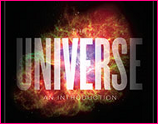 The Universe: An Introduction from Smithsonian Education provides astronomy lesson plans, class activities, and a profile on astronomer Lisa Kaltenegger, who is in the burgeoning business of “planet hunting.” As part of the activities, an online interactive game is available.
The Universe: An Introduction from Smithsonian Education provides astronomy lesson plans, class activities, and a profile on astronomer Lisa Kaltenegger, who is in the burgeoning business of “planet hunting.” As part of the activities, an online interactive game is available.
Read More
Filed under: Web Resources | Comments Off on Resource: The Universe from Smithsonian
Tags: Astronomy, Internet Resources, Lesson Plans, Web Resources
Posted on August 9th, 2010 by ASEE
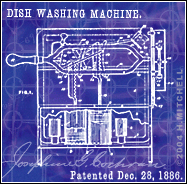 The Inventor of the Week Web page is part of the Lemelson-MIT program to honor “the acclaimed and unsung heroes who have helped improve our lives through invention.” A rich archive of brief online articles highlights the accomplishment of researchers and engineers, providing a sense of their work, struggles, and path to invention and success. Who invented Gatorade and the Hovercraft, and which woman paved the way for the first dishwasher? Your students can find out here.
The Inventor of the Week Web page is part of the Lemelson-MIT program to honor “the acclaimed and unsung heroes who have helped improve our lives through invention.” A rich archive of brief online articles highlights the accomplishment of researchers and engineers, providing a sense of their work, struggles, and path to invention and success. Who invented Gatorade and the Hovercraft, and which woman paved the way for the first dishwasher? Your students can find out here.
Read More
Filed under: Web Resources | Comments Off on Website: Inventor Profiles
Tags: Ideas & Inventions, Internet Resources, MIT, Web Resources
Posted on August 2nd, 2010 by Jaimie Schock
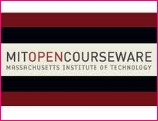 Highlights for High School is an MIT initiative providing free, open source teaching and learning materials to high school teachers and students. These materials include video lecture clips, lecture notes, practice problems, exams, and other resources from MIT’s introductory physics, biology, and calculus courses; mini-courses for high school students developed by MIT students; and an introduction for students to the college-level MIT curriculum and course materials on OpenCourseWare.
Highlights for High School is an MIT initiative providing free, open source teaching and learning materials to high school teachers and students. These materials include video lecture clips, lecture notes, practice problems, exams, and other resources from MIT’s introductory physics, biology, and calculus courses; mini-courses for high school students developed by MIT students; and an introduction for students to the college-level MIT curriculum and course materials on OpenCourseWare.
Read More
Filed under: Web Resources | Comments Off on Resource: Free Online MIT Course Materials
Tags: Courses, Curriculum, Internet Resources, MIT, Resources for Teachers, Science materials, Web Resources
Posted on August 1st, 2010 by Jaimie Schock
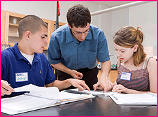 The National Science Resources Center (NSRC) was established in 1985 by the Smithsonian Institution and the National Academies. Its mission is to improve the learning and teaching of science for all students in the United States and throughout the world. It provides listings of regional science centers, museums, science websites and other resources; information on how to participate in programs to improve science education; and NSRC internships.
The National Science Resources Center (NSRC) was established in 1985 by the Smithsonian Institution and the National Academies. Its mission is to improve the learning and teaching of science for all students in the United States and throughout the world. It provides listings of regional science centers, museums, science websites and other resources; information on how to participate in programs to improve science education; and NSRC internships.
Read More
Filed under: Web Resources | Comments Off on Website: National Science Resources Center
Tags: Internet Resources, Internships, Outreach for Schools, Research on Learning, Web Resources, Website
Posted on July 19th, 2010 by Jaimie Schock
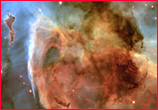 The Naval Oceanography Portal website maintains an Astronomical Information Center that contains a variety of informative resources. The directory features a glossary of terms, important definitions, fun facts, in-depth articles, data sets, lists, mathematical equations, and links to outside resources. Some topics include phenomena of the sun and moon, time, calendars and events, computing astronomical data, celestial navigation, and more.
The Naval Oceanography Portal website maintains an Astronomical Information Center that contains a variety of informative resources. The directory features a glossary of terms, important definitions, fun facts, in-depth articles, data sets, lists, mathematical equations, and links to outside resources. Some topics include phenomena of the sun and moon, time, calendars and events, computing astronomical data, celestial navigation, and more.
Read More
Filed under: Web Resources | Comments Off on Resource: Naval Astronomical Information Center
Tags: Astronomy, Internet Resources, Publication, Software, U.S. Navy, Web Resources
Posted on July 19th, 2010 by Jaimie Schock
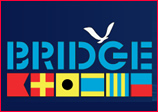 The Bridge Ocean Education Teacher Resource Center from the National Marine Educators Association offers a host of different resources approved by teachers, for teachers. The website features news, lesson plans, activities, data, publications, virtual expeditions, information on science topics, featured websites, teacher-chosen web resources, help in guiding students, science fairs, student programs, and professional development like workshops, grants, awards, courses, distance learning, and summer programs.
The Bridge Ocean Education Teacher Resource Center from the National Marine Educators Association offers a host of different resources approved by teachers, for teachers. The website features news, lesson plans, activities, data, publications, virtual expeditions, information on science topics, featured websites, teacher-chosen web resources, help in guiding students, science fairs, student programs, and professional development like workshops, grants, awards, courses, distance learning, and summer programs.
Read More
Filed under: For Teachers, Grades 6-8, Grades 9-12, Grades K-5, K-12 Outreach Programs, Web Resources | Comments Off on Website: Ocean Education Teacher Center
Tags: Internet Resources, Ocean, Outreach, Teaching Aids, Web Resources
Posted on July 8th, 2010 by ASEE
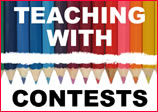 The Teaching with Contests website lists various contests suitable for use in the classroom with students, as well as competitions geared to educators. It features contests and programs that have a primary goal of education, such as the Audubon Photography Contest, PBS Design Squad Trash to Treasure Contest, and The Ron Clark Academy’s Great American Teacher Awards.
The Teaching with Contests website lists various contests suitable for use in the classroom with students, as well as competitions geared to educators. It features contests and programs that have a primary goal of education, such as the Audubon Photography Contest, PBS Design Squad Trash to Treasure Contest, and The Ron Clark Academy’s Great American Teacher Awards.
Read More
Filed under: Web Resources | Comments Off on Website: Teaching with Contests
Tags: Contests, Internet Resources, Web Resources, Website
Posted on July 5th, 2010 by Jaimie Schock
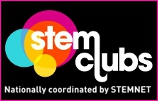 The STEM Clubs Network, which caters to schools in the United Kingdom, also provides best practice information, professional advice, shared resources, tips, and more for starting and running STEM-based extracurricular clubs for the middle and high school levels.
The STEM Clubs Network, which caters to schools in the United Kingdom, also provides best practice information, professional advice, shared resources, tips, and more for starting and running STEM-based extracurricular clubs for the middle and high school levels.
Read More
Filed under: Web Resources | Comments Off on Website: STEM Clubs Network
Tags: Internet Resources, Organizations, Outreach for Schools, STEM Clubs, STEM education, STEM subjects, Teaching Aids, Web Resources, Website
Posted on July 5th, 2010 by Jaimie Schock
 In this detailed .pdf from the HandsOn Network, teachers and educational leaders interested in starting math and science clubs find instructions, advice and tips, a sample agenda, and additional web resources. Math and science clubs can give students a safe environment to learn and interact with others with similar interests. They can also provide a safe place for students to explore and discover, especially for those who may not have strong support at home.
In this detailed .pdf from the HandsOn Network, teachers and educational leaders interested in starting math and science clubs find instructions, advice and tips, a sample agenda, and additional web resources. Math and science clubs can give students a safe environment to learn and interact with others with similar interests. They can also provide a safe place for students to explore and discover, especially for those who may not have strong support at home.
Read More
Filed under: Web Resources | Comments Off on Resource: Math and Science Club Step-by-Step Guide
Tags: Internet Resources, Math, Mathematics, STEM Clubs, Web Resources
 The Universe: An Introduction from Smithsonian Education provides astronomy lesson plans, class activities, and a profile on astronomer Lisa Kaltenegger, who is in the burgeoning business of “planet hunting.” As part of the activities, an online interactive game is available.
The Universe: An Introduction from Smithsonian Education provides astronomy lesson plans, class activities, and a profile on astronomer Lisa Kaltenegger, who is in the burgeoning business of “planet hunting.” As part of the activities, an online interactive game is available.








 The Inventor of the Week Web page is part of the Lemelson-MIT program to honor “the acclaimed and unsung heroes who have helped improve our lives through invention.” A rich archive of brief online articles highlights the accomplishment of researchers and engineers, providing a sense of their work, struggles, and path to invention and success. Who invented Gatorade and the Hovercraft, and which woman paved the way for the first dishwasher? Your students can find out here.
The Inventor of the Week Web page is part of the Lemelson-MIT program to honor “the acclaimed and unsung heroes who have helped improve our lives through invention.” A rich archive of brief online articles highlights the accomplishment of researchers and engineers, providing a sense of their work, struggles, and path to invention and success. Who invented Gatorade and the Hovercraft, and which woman paved the way for the first dishwasher? Your students can find out here. Highlights for High School is an MIT initiative providing free, open source teaching and learning materials to high school teachers and students. These materials include video lecture clips, lecture notes, practice problems, exams, and other resources from MIT’s introductory physics, biology, and calculus courses; mini-courses for high school students developed by MIT students; and an introduction for students to the college-level MIT curriculum and course materials on OpenCourseWare.
Highlights for High School is an MIT initiative providing free, open source teaching and learning materials to high school teachers and students. These materials include video lecture clips, lecture notes, practice problems, exams, and other resources from MIT’s introductory physics, biology, and calculus courses; mini-courses for high school students developed by MIT students; and an introduction for students to the college-level MIT curriculum and course materials on OpenCourseWare. The National Science Resources Center (NSRC) was established in 1985 by the Smithsonian Institution and the National Academies. Its mission is to improve the learning and teaching of science for all students in the United States and throughout the world. It provides listings of regional science centers, museums, science websites and other resources; information on how to participate in programs to improve science education; and NSRC internships.
The National Science Resources Center (NSRC) was established in 1985 by the Smithsonian Institution and the National Academies. Its mission is to improve the learning and teaching of science for all students in the United States and throughout the world. It provides listings of regional science centers, museums, science websites and other resources; information on how to participate in programs to improve science education; and NSRC internships. The Naval Oceanography Portal website maintains an
The Naval Oceanography Portal website maintains an  The
The  The Teaching with Contests website lists various contests suitable for use in the classroom with students, as well as competitions geared to educators. It features contests and programs that have a primary goal of education, such as the Audubon Photography Contest, PBS Design Squad Trash to Treasure Contest, and The Ron Clark Academy’s Great American Teacher Awards.
The Teaching with Contests website lists various contests suitable for use in the classroom with students, as well as competitions geared to educators. It features contests and programs that have a primary goal of education, such as the Audubon Photography Contest, PBS Design Squad Trash to Treasure Contest, and The Ron Clark Academy’s Great American Teacher Awards. The
The  In
In